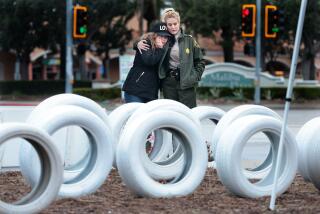Costa Mesa Police to wear body cameras following $1M contract
- Share via
Officers in the Costa Mesa Police Department will begin wearing body cameras able to record audio and video footage of traffic stops, arrests and interactions with the public, now that City Council members have approved spending nearly $1 million on a cloud-based monitoring system.
The move puts Costa Mesa in line with other Orange County cities where such cameras are already in use. In recent years, Huntington Beach, Anaheim, Santa Ana and Fullerton have adopted officer-worn camera programs. In Irvine, the City Council was set to hear a similar proposal Tuesday evening.
For the record:
5:19 p.m. Aug. 3, 2020An earlier version of this story misstated that the Orange County Sheriff’s Department has been wearing body camera devices for about a year. The department has completed two pilot programs and has a draft plan and schedule for implementation of the body-worn camera project, but deputies have not yet been outfitted with the devices on a permanent basis.
Orange County Sheriff’s Department deputies have been wearing the units for more than a year.
Costa Mesa Police Chief Bryan Glass said a plan to upgrade the department’s aging system — 46 in-car video systems and wearable audio-recording devices for most sworn officers — was underway when demonstrations against racial inequality and police brutality broke out in late May.
“We were already looking at improving upon the system we had or replacing it,” Glass said of the audio and video systems purchased in 2013. “We saw [body cameras] as a useful tool for our everyday duties.”
Thousands of protesters have converged in Orange County to speak out about the death of unarmed Black man George Floyd while in the custody of Minneapolis police, as well as other Black men, women and children who have died at the hands of police.
Council members had budgeted $883,520 for the needed upgrade and at a June 16 meeting raised the funding by $113,760 after a vendor was selected.
Texas-based video security company WatchGuard will provide 60 high-definition in-car video units and 100 wearable camera sets, in addition to accessories, redaction software, maintenance and support, according to the contract.
Costa Mesa officers have been recording video footage since 1998, when cumbersome VHS tapes had to be viewed on VCRs. Audio recording devices helped provide some mobility outside patrol vehicles, but not much.
Glass said the new dash cams will provide panoramic views from patrol cars, as well as back-seat footage, which will aid in investigations. The body cams will be rolling as officers exit their vehicles, a capability that was stunted in earlier iterations.
“Now we’ll have the ability to walk away from the cars with the same transmitters and capture what we’re seeing leaving the unit,” he said.
Costa Mesa Mayor Katrina Foley said the new devices will aid in transparency and will benefit community members and officers, as information is captured in a cloud-based management system. Data can be used not only as evidence in an investigation but as a record of public testimony, she said.
“If somebody makes a complaint, we can see what happened,” Foley said. “That’s protective of both the individual who alleges the conduct as well as police officers.”
The appetite for officer-worn cameras, however, is hardly universal. In Los Angeles County, supervisors on Tuesday again requested that the Los Angeles Sheriff’s Department immediately implement a monitoring program after eight years of cajoling.
Supervisors recommended body cameras in 2012 and set aside $34.78 million last September to equip 5,200 sheriff’s deputies and security officers with the devices, yet they have seen little progress. In a release issued Tuesday, supervisors called the program “long overdue.”
“In discussions about law enforcement accountability and greater transparency, which, frankly, come amid nationwide unrest over police brutality and use of deadly force, implementation of body-worn cameras must be a priority for LASD,” Supervisor Mark Ridley-Thomas said in the release. “We ask they meet our efforts and do the same — to make this program a reality.”
Sheriff Alex Villanueva responded, promising to roll out a program later this year.
Like in Costa Mesa, police in Irvine have for years used dash cams and wearable audio recorders, according to spokeswoman Sgt. Karie Davies.
Davies said officials had been planning an overhaul of the city’s computer-aided dispatch and records management system, as well as purchasing officer-worn cameras, when the recent protests began.
After public demonstrations began raising awareness around police accountability — and following criticism of comments made by Irvine Mayor Christina Shea in support of the city’s police force — Chief Mike Hamel decided to expedite the body camera program.
“We already had a budget for a body-worn camera pilot program for next year, but we decided to move up that date given the current situation,” Hamel said in an email Tuesday. “Body-worn cameras are the next step in our evolution to memorialize contacts with the public, while enhancing public trust and accountability.”
Cardine writes for Times Community News.
More to Read
Sign up for Essential California
The most important California stories and recommendations in your inbox every morning.
You may occasionally receive promotional content from the Los Angeles Times.












